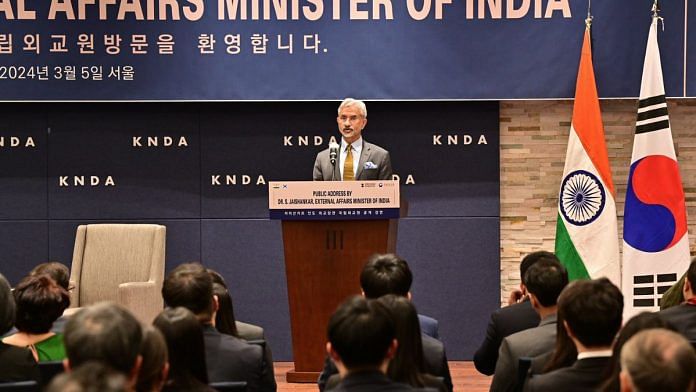New Delhi: Foreign Minister S. Jaishankar has termed the ongoing ethnic clashes in Manipur as “truly tragic”, asserting that this was not the one India was hoping for.
Currently on a four-day visit to South Korea and Japan, Jaishankar told the diaspora in Seoul Tuesday evening that the entire country wanted to see normalcy return to the northeast state.
Manipur is seeing massive unrest — with no solution yet in sight — between the valley-based Hindu Meitei community and the hill-based Kuki tribes.
It started last May when the majority Meitei community demanded they be included in the scheduled tribes (ST) category – a special status reserved for the largely-Christian tribes.
“In terms of how this happened (the situation in Manipur), how did the government let it happen,” Jaishankar told Indians in Seoul. Incidentally, the BJP is in power in the state.
The minister said everybody regretted what was happening in Manipur. “What has happened is truly tragic. It is tragic because of the close intermingling of communities, which has created this degree of violence,” he added.
“I think the wishes of the country are very much with Manipur. I mean people would like to see normalcy return; they would like to see law and order get back. This is not the India and certainly not the Northeast that anybody was hoping for.”
Open borders with Myanmar
The foreign minister said one of the reasons for these clashes was the open border between India and Myanmar, which allowed the movement of tribes inside each country without visa.
Jaishankar said this “unique system” or the Free Movement Regime (FMR) had allowed citizens of the two countries to travel 16 km either way without travel documents. “Unfortunately after all these tragic events (in Manipur), we have now decided to suspend that provision and actually harden the border situation,” he said.
In February 2024, Union Home Minister Amit Shah ended the FMR and announced the government’s intent to fence the 1,643-km long border between the two countries. The FMR was established by the two governments in 2018.
The fencing of borders had raised questions about India’s ‘Act East Policy’ which Prime Minister Narendra Modi had announced in 2014 to focus on India’s extended neighbourhood in the Asia-Pacific region.
‘Northeast as bridge’
Jaishankar explained the situation in Manipur was “disturbing” since the “potential” of the whole Northeast was just beginning to unfold.
He said that previously it was difficult to travel in the region, and that there was hardly any business and the resources provided were miniscule.
But all that had changed in the last 10 years, the minister said, under the governance of the BJP-led National Democratic Alliance. “Which is why (the unrest) in Manipur is so disturbing.”
Jaishankar, however, believes that the Northeast can be a cultural and geographical “bridge” to the extended region. He highlighted the deepening of ties between India and Bangladesh as an example.
“Our relations with Bangladesh have changed tremendously. You see railways, roads, trains, waterways… Goods are going to Bangladesh ports, electricity is being supplied. It has given the whole area a boost,” explained Jaishankar.
The minister added: “We are also trying to see if we can benefit in a similar way by connecting more closely with Bhutan.” (EOM)
(Edited by Tikli Basu)
Also read: Manipur commandos lay down arms to protest against ‘attacks on police’, ‘not being given free hand’



